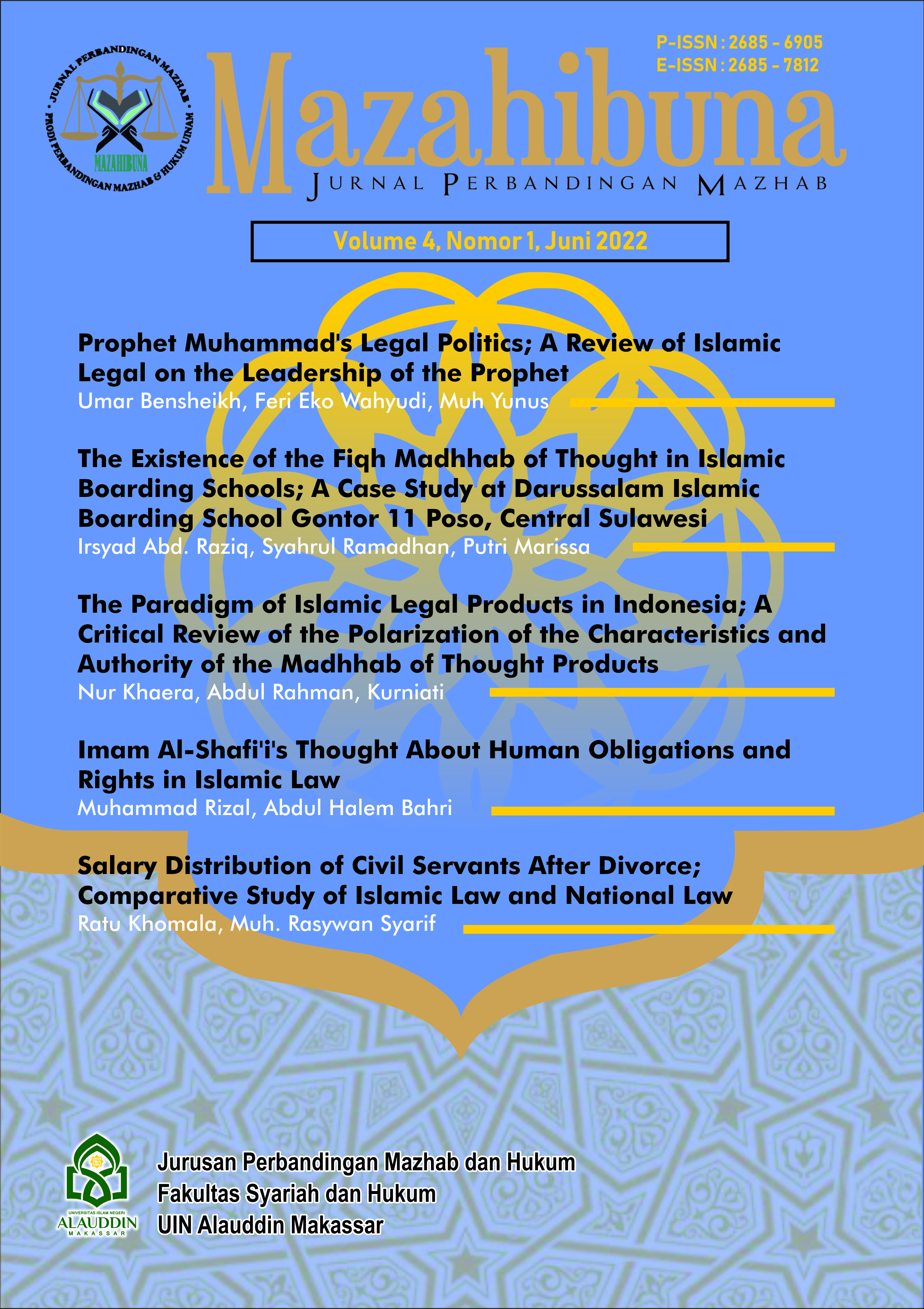Salary Distribution of Civil Servants After Divorce
Comparative Study of Islamic Law and National Law
Abstrak
This article reviews Islamic and National Laws on the distribution of salaries of Civil Servants after divorce. Field research was conducted using a sociological approach at the Belopa Religious Court, South Sulawesi. The results found that judges at the Belopa Religious Court, deciding divorce cases for civil servants in terms of salary distribution, did not apply Government Regulation Number 10 of 1983 to Number 45 of 1990 as a rule. Under the Compilation of Islamic Law, the judge only decides where the defendant is charged with iddah, mut’ah, house, and hadhanah. Meanwhile, law enforcement and justice should socialize related to legal problems where ordinary people can understand the legal consequences in society. The public should be able to understand the legal consequences of their divorce, especially civil servants.
Referensi
Andiko, Toha, and Fauzan Fauzan. “Dilema Perceraian Suami Muslim Pegawai Negeri Sipil Di Propinsi Bengkulu.” Al-Ulum 19, no. 1 (2019): 103–28. https://doi.org/10.30603/au.v19i1.747.
Azidah, Nurul. “Status Pembagian Gaji Pegawai Negeri Sipil Pada Mantan Istri Dalam Pandangan Hukum Islam.” Miyah: Journal of Islamic Studies 16, no. 2 (2020): 318–32. https://doi.org/10.33754/miyah.v16i2.280.
Bidaya, Zaini, and Wawan Indrawan. “Kedudukan Hukum Tentang Hak Istri Pegawai Negeri Sipil Yang Diceraikan Berdasarkan Peraturan Pemerintah No. 10 Tahun 1983.” CIVICUS : Pendidikan-Penelitian-Pengabdian Pendidikan Pancasila Dan Kewarganegaraan 7, no. 1 (2019): 94. https://doi.org/10.31764/civicus.v0i0.854.
Fadri, Khairil, Mukhlis, and Yusrizal. “Kewenangan Pengadilan Agama Dan Pengadilan Tata Usaha Negara Terhadap Pembebanan Nafkah Anak Akibat Perceraian Pegawai Negeri Sipil Authority of Religious Court and Administrative Court on the Imposition of Living Cost for Children To Civil Service Divorc.” Suloh Jurnal Program Studi Magister Hukum 8, no. 1 (2020): 48–69.
Fauziah, Luluk. “1. Luluk Fauziah Dalam Skripsnya Pembatalan Putusan Pengadilan Tinggi Agama Surabaya No. 314/Pdt.G/2012/PTA.SBY Terhadap Putusan Pembatalan Putusan Pengadilan Tinggi Agama Sidoardjo No.314/Pdt.G/2012/PA.SDA Tentang Pembagian Sepertiga Gaji Pegawai Negeri .” Universitas Islam Negeri Sunan Ampel Surabaya, 2018. http://digilib.uinsby.ac.id/23440/3/Luluk Fauziah_C01213045.pdf.
Herawati, Tri Wahyuni, Yunanto, and Herni Widanarti. “Perlindungan Hak Atas Pembagian Gaji Akibat Perceraian Yang Dilakukan Oleh Pegawai Negeri Sipil.” Diponegoro Law Journal 6, no. 2 (2017): 1–12. https://ejournal3.undip.ac.id/index.php/dlr/article/view/17444/0.
Hilmi, Badrul. “Rekonvensi Pembagian Gaji Pegawai Negeri Sipil Dalam Perkara Cerai Talak (Analisis Putusan Perkara No. 4455/Pdt. Cr/2014/PA. Blitar).” Sakina: Journal of Family Studies 4, no. 2 (2020). http://urj.uin-malang.ac.id/index.php/jfs/article/view/480.
Himayasari, Neng Dewi, and Intan Nurrachmi. “Analisis Keputusan Dirjen Bimas Islam No DJ.III/342 Tahun 2016 Terhadap Kewenangan Penyuluh Agama Sebagai Narasumber Bimbingan Pra Nikah Di Kota Bandung.” Tahkim; Jurnal Peradaban Dan Hukum Islam 2, no. 2 (2019): 1–23.
Karmuji, Karmuji, and Nofan Andrian Usmani Putra. “Peran Penyuluh Agama Islam Non PNS Bidang Perkawinan Dalam Upaya Membina Keluarga Sakinah (Studi Di KUA Kecamatan Panceng Kabupaten Gresik).” The Indonesian Journal of Islamic Law and Civil Law 1, no. 2 (2020): 103–24. https://doi.org/10.51675/jaksya.v1i2.150.
Kusmayanti, Hazar, and Nindya Tien Ramadhanty. “Legitimacy of a Sirri Marriages (Second and So on) By the Pair of Civil Servants.” DiH: Jurnal Ilmu Hukum 17, no. 1 (2021): 84–93. https://doi.org/10.30996/dih.v17i1.4512.
Mustafa, Faisal Fauzan. “Peran Pranata Keuangan Dalam Eksekusi Nafkah Anak Perceraian Pegawai Negeri Sipil.” El-USRAH: Jurnal Hukum Keluarga 4, no. 1 (2021): 172. https://doi.org/10.22373/ujhk.v4i1.9959.
Nurlaelawati, Euis. “Muslim Women in Indonesian Religious Courts.” Islamic Law and Society 20, no. 3 (2013): 242–71. https://doi.org/10.1163/15685195-0010A0003.
Rozak, Arif Miftakhur. “Studi Analisis Terhadap Putusan Pengadilan Agama Blora Nomor 258/Pdt.G/2015/PA.Bla. Tentang Batasan Pemberian 1/3 Gaji Pegawai Negeri Sipil Kepada Bekas Isteri Sampai Masa Iddah.” Universitas Islam Negeri Walisongo Semarang, 2016. https://eprints.walisongo.ac.id/id/eprint/5689/1/092111020.pdf.
Sudirman, Ramadhita, Syabbul Bachri, Erfaniah Zuhriah, and Zaenul Mahmudi. “The Family Corner for the Post-COVID 19 Revitalization of Family Function.” Samarah 5, no. 1 (2021): 88–107. https://doi.org/10.22373/sjhk.v5i1.9122.
Tien Ramadhanty, Nindya, Djanuardi D, and Eidy Sandra. “Perkawinan Siri Pasangan Pegawai Negeri Sipil Di Pemerintahan Kabupaten Serang Menurut Peraturan Pemerintah Nomor 45 Tahun 1990 Tentang Izin Perkawinan Dan Perceraian Bagi Pegawai Negeri Sipil, Hukum Islam Dan Kompilasi Hukum Islam.” Jurnal Hukum Positum 5, no. 1 (2020): 83. https://doi.org/10.35706/positum.v5i1.3483.
Widyakso, Rendra, and Fifik Wiryani. “Analisis Pelaksanaan Putusan Peradilan Agama Terhadap Nafkah Perceraian Dalam Perspektif Hukum Nasional Dan Hukum Islam Bagi PNS.” Audito Comparative Law Journal 2, no. 2 (2021): 86–109.

This work is licensed under a Creative Commons Attribution 4.0 International License.
Authors who publish with Mazahibuna: Jurnal Perbandingan Mazhab agree to the following terms:
- Authors retain copyright and grant the Mazahibuna: Jurnal Perbandingan Mazhab right of first publication with the work simultaneously licensed under Creative Commons Attribution License (CC BY 4.0) that allows others to share the work with an acknowledgment of the work's authorship and initial publication in this journal.
- Authors can enter into separate, additional contractual arrangements for the non-exclusive distribution of the published version of the work (e.g., post it to an institutional repository or edit it in a book), with an acknowledgment of its initial publication in this journal.
- Authors are permitted and encouraged to post their work online (e.g., in institutional repositories or on their website) before and during the submission process, as it can lead to productive exchanges, as well as earlier and greater citation of published work.

